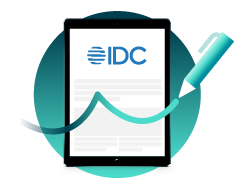Digital account opening and customer onboarding best practices

The state of digital account opening and customer onboarding experiences in today’s business environment
Organizations know that providing an exceptional digital customer experience is a necessity to attract and retain customers in highly competitive environments. This is especially true when it’s not possible to differentiate based on product offering alone. In such cases, organizations need to focus on the experience, service, and convenience they provide.
Across many industries, account opening and customer onboarding are critical stages to attract new business, as well as for customer retention, and are often one of the first areas that organizations look to digitize. Despite the push for end-to-end digitization of account opening and user onboarding processes, many organizations are still dealing with legacy systems and apps that present a functional barrier to accelerating their digital projects. The result is a lengthy, semi-digital process that is often difficult to get through, for staff and customers alike. This is particularly true for financial institutions.
What are the benefits of digital account opening and customer onboarding programs?
The pain points of new account opening and customer onboarding processes in the banking industry are highlighted by the recent bank failures in the US (Silicon Valley Bank [SVB], Signature Bank, and First Republic). When these banks collapsed, tens of thousands of ex-customers turned to more traditional top-tier banks as new users to open a bank account for their business or personal banking. The result: a sudden increase in application volumes.
An NFX survey undertaken in the wake of the SVB failure found that following the collapse, the number of companies who said they would choose to open an account with a top tier bank nearly doubled, from 31% to 57%.
This influx of customers exposed the inefficiencies of the account opening process at some of the top-tier banks, underscoring the urgency to rethink digital onboarding to make it fast, digital, and seamless, regardless of locations, channels, and volumes.
In this article we look at ways financial institutions and organizations across industries can streamline their account opening and onboarding processes to deliver convenient and effective customer onboarding.
How to streamline customer data capture with smart forms during digital account opening
Typically, the first step in the account opening process involves customer data capture. This is the stage at which the customer enters their personal details.
Data capture remains a cumbersome process, whether manually (where the customer shows up at a branch for a face-to-face questionnaire), or digitally through inflexible PDF forms.
By leveraging smart digital forms, organizations can create a more engaging, frictionless experience. Applicants can provide information on their own devices from almost anywhere, without the need for an in-person appointment or branch visit. Smart forms, such as SmartIQ, leverage an intelligent interview-style step-by-step system to collect personal information. Smart forms can also reuse information when possible and automatically adapt to asking new questions based on previous answers.
When all the questions are answered, OneSpan smart forms can automatically generate a signature-ready agreement that can be electronically signed instantly using e-signatures.
This streamlined digital process is faster, more customer-friendly and less prone to errors.
How to digitize identity verification with ID document verification and facial comparison
Organizations invest large amounts of money every year to attract and acquire new customers. Unfortunately, much of the money spent getting applicants to respond to marketing offers is wasted when applicants hit a barrier and drop out during the account opening process.
A report by Sapio Research in November 2022 on behalf of ABBYY1 examining industry trends in online account origination, digital banking, and consumer abandonment highlighted some striking figures. They found that for 90% of organizations, friction during the digital account opening process caused abandonment rates of up to 40%, and in some cases even more. The top reasons given for abandonment included too many manual steps, the process being too long, and friction caused by KYC (know your customer) and identity verification requirements.
To improve the customer journey during identity verification, organizations can leverage ID document verification functionality to verify the identity of an applicant. Document verification is an innovative approach to digital identity verification that offers a strong alternative to traditional and in-person verification methods, enabling organizations to keep the workflow 100% digital and reduce abandonment as a result.
Organizations can use Identity Verification solutions to reduce friction in the account opening process, while also leveraging real-time government ID verification to help reduce the risk of identity fraud.
ID document verification involves verifying the authenticity of an individual's ID document, such as a driver’s license, passport, or government ID. This is typically done in combination with a form of biometric verification, such as facial comparison, which utilizes a selfie image to verify that the person presenting the ID is the same individual whose portrait is on the ID. To ensure the accuracy of the biometric verification process, liveness detection technology is used to identify any attempts at spoofing, such as masks or photos of photos, and to confirm that the selfie being presented is genuine.
OneSpan Identity Verification provides a secure and efficient way to verify the identity of customers. The advanced technology of the solution offers accurate and reliable identity verification, protecting organizations from fraud, and helping to ensure compliance with regulatory requirements.
How organizations can digitize document approval and signing with e-signatures
Once the customer’s information has been collected and their identity has been verified, standard follow-up is for both parties to sign an agreement to make the relationship official.
By leveraging e-signatures, documents can be signed digitally in an easy and secure manner, setting the process up for customer success as well as organizational success.
With OneSpan Sign, any business can create an agreement chain and include an unlimited number of employees as part of this chain. Employees can be given signature ability, view-only permission or assigned any other necessary role. Documents can be sent to an entire group of stakeholders at once or assigned a specific order in which to view or sign documents. Using OneSpan Sign, those documents can be completed in minutes and passed to the next stage of the process to speed up the account opening and the digital onboarding of the new customer.
How to maintain a human touch during digital account opening and onboarding
To achieve a successful onboarding flow in a world where digital is becoming the norm, businesses must balance the convenience of the virtual world with the personal touch of the real world. Customers expect their financial service provider, telecom provider, or even healthcare provider, to offer the same digital experience they are receiving in other areas of their life. For instance, the proliferation of existing SaaS-based tools that improve digital experiences such as Zoom, Microsoft Teams, or AI-based chatbots, are now proven and effective enablers of digital innovation.
However, automation is no longer enough. Security as well as a human connection are needed, and the requirement for collaboration is a must-have. In a world where we are making more decisions and transactions on digital platforms, organizations need secure, virtual spaces where business processes and the creation and signing of agreements can take place securely.
Using video-based virtual environments, organizations can move away from their reliance on static online portals and offer the same face-to-face account opening experience customers might expect to receive from a branch visit, without the need for them to leave their homes or place of work.
This direct interaction allows customers to feel that their service is personalized, especially with higher-value transactions. This increases the value of their connection to the organization they are transacting with while also providing the service they need. The levels of security and identity verification required for account opening can often be time-consuming for high-value clients in an in-person setting. This can take multiple visits to ensure all paperwork, applications, and identity verifications are completed. A virtual signing room allows for these applications and account changes to be made in real-time.
To strengthen security and compliance, video-based virtual experiences should also integrate digital identity authentication and verification to verify the identity of an applicant, as well as track compliance and non-repudiation.
With OneSpan Virtual Room, advisors can help customers open accounts in real time. Instead of multiple back-and-forth email or phone conversations to address questions and complete activities, digital account opening solutions like Virtual Room can help organizations provide a personalized experience, including real-time assistance that ensures customer needs and questions are addressed to complete applications in a single session. Robust identity verification enables organizations to verify both known and unknown applicants before the account is opened, and comprehensive audit trails and the option to record the virtual session easily demonstrates compliance.
Transforming account opening with smart forms, ID document verification, e-signatures and secure virtual environments
In a world where new clients expect convenience and speed, it is essential that organizations respond to changing customer demand by offering a user experience built around digital channels. Forcing a prospective customer to use multiple channels (branch, online, call center etc.), or use outdated processes, such as in-person identity verification, creates less than optimal first impressions, and frustration that can lead to account opening abandonment and negative customer reviews. Outdated processes can also impact customer churn metrics, as existing customers increasingly associate innovation (or relative lack of it) with the value of products or services.
The good news is that there are modern and effective approaches to digital account opening available in the market today. These approaches not only help prevent application fraud, but also reduce unnecessary friction in the customer journey.
Whether looking at account opening, employee onboarding, client onboarding, or other forms of first-day processes and customer acquisition, organizations must embrace a digital transformation initiative. These digitization efforts need to be optimized using innovative technology such as smart forms, ID document verification, e-signatures, and secure virtual environments, to deliver an exceptional digital onboarding experience, from beginning to end.
1 “State of Intelligent Automation Report: Customer Onboarding Drivers and Pain Points.” ABBYY, November 2022. https://www.abbyy.com/resources/report/customer-onboarding-drivers-and-pain-points/.




